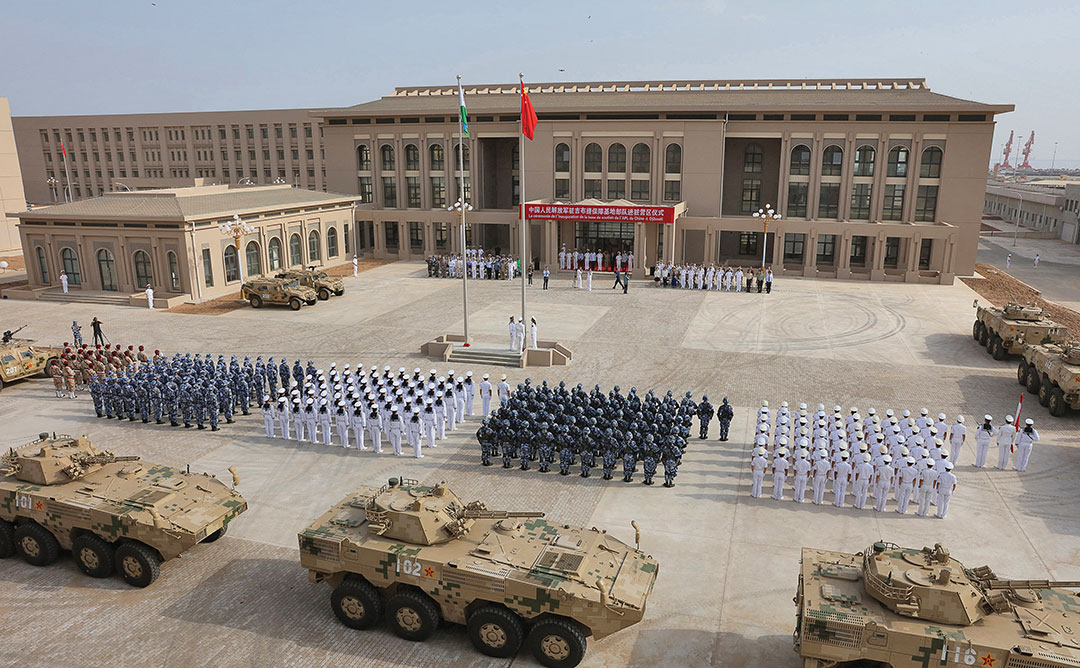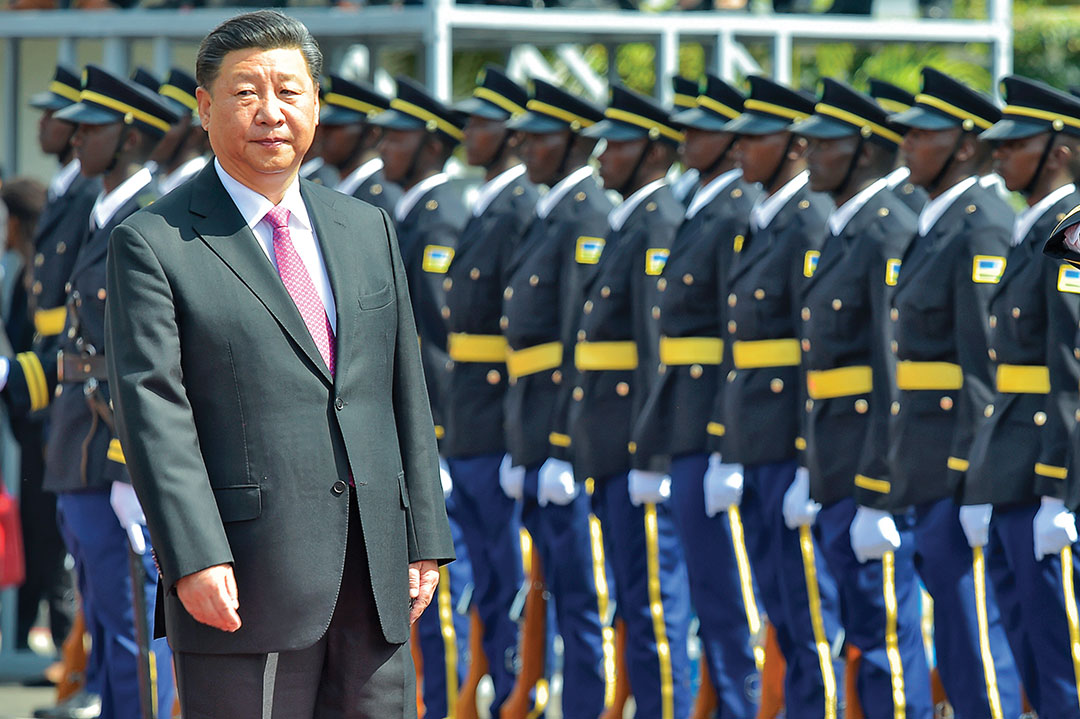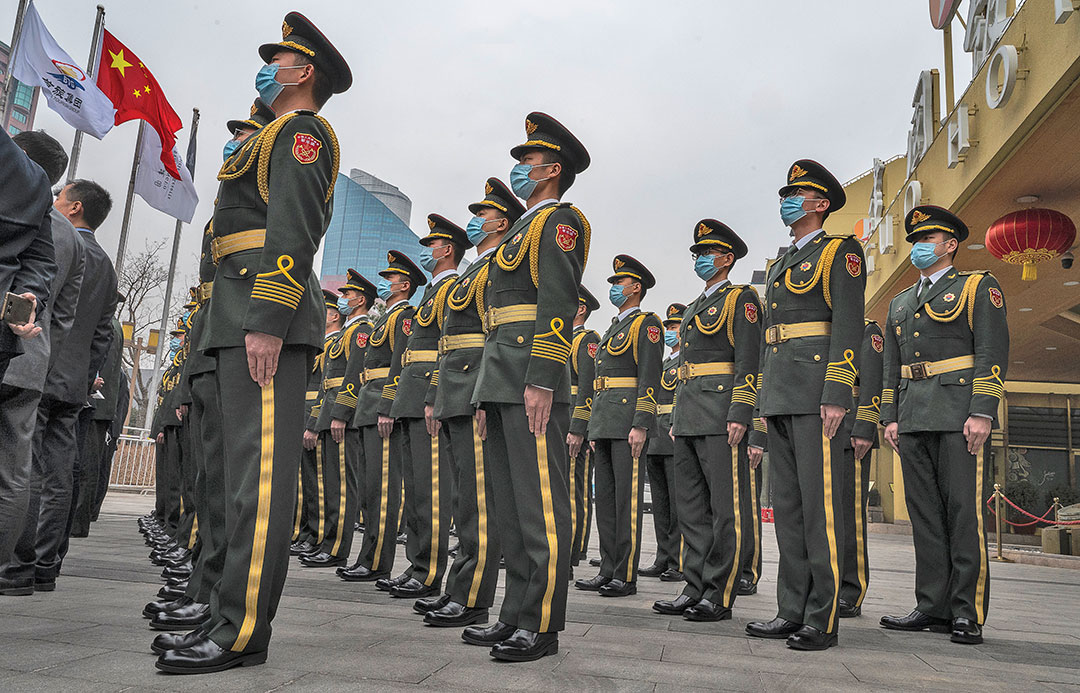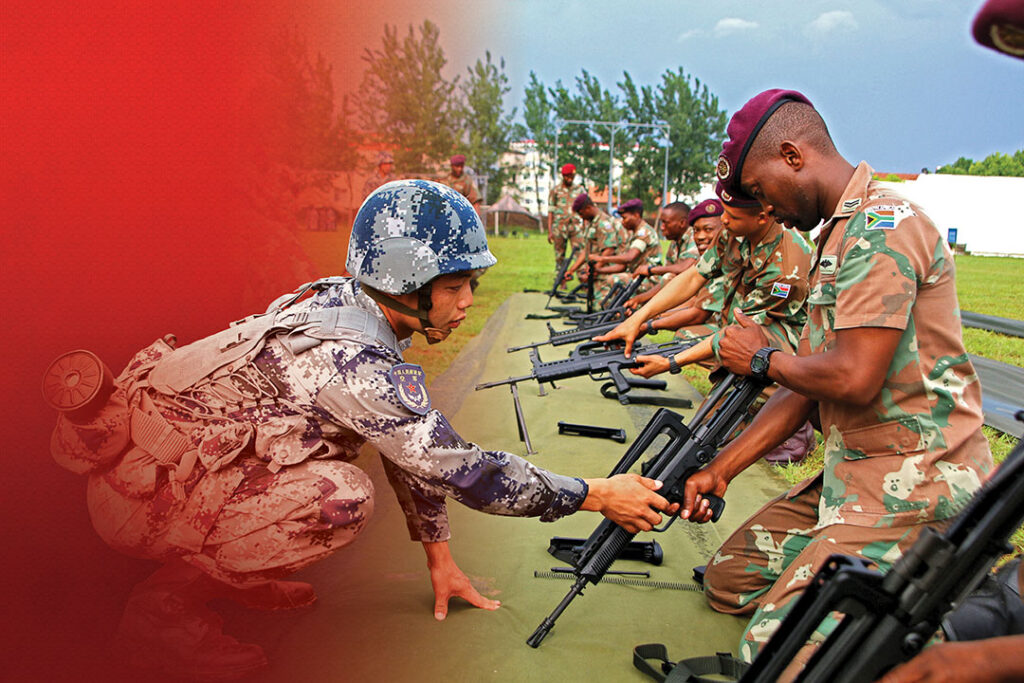ADF STAFF
China’s interest and involvement in Africa includes everything from establishing economic markets to negotiating lucrative infrastructure projects worth billions of dollars.
The communist nation also is known for what it takes from the continent. China’s distant-water fishing fleet plunders African waters. The People’s Liberation Army (PLA) seeks to expand its naval presence — already established in East Africa — to West Africa’s coast, a move that could protect its fishing interests there.
A lesser-known Chinese endeavor, however, seeks to shape the very framework of how African militaries operate and relate to civilian government. A nation known for its exports now is sending more than just textiles and electronics to the continent: China is spreading its “party-army” military model, which makes the army devoted to the ruling party, not the government and its people.
“The Chinese party-army model has obvious appeal to some African ruling party and military leaders who welcome redefining the role of the military as ensuring the survival of the ruling party,” wrote research associate Paul Nantulya for the Africa Center for Strategic Studies (ACSS). “It also tends to reinforce elite networks and hierarchies, which feature heavily in China’s political relationships and often supersede institutional and constitutional procedures.”

WHAT IS THE ‘PARTY-ARMY’ MODEL?
In his book, “Problems of War and Strategy,” Chinese Communist leader Mao Zedong wrote, “Our Principle is that the Party commands the gun, and the gun must never be allowed to command the Party.” The result is a PLA that exists first and foremost to protect and sustain the Chinese Communist Party (CCP), serving as its “armed wing.”
The CCP’s Central Military Commission (CMC) is chaired by Chinese President Xi Jinping and is the nation’s top military decision-making body, according to “Military and Security Developments Involving the People’s Republic of China 2020,” an annual report to the United States Congress.
The CMC has operational control of the military and is beholden to the Politburo, the party’s highest authority, wrote Nantulya in his July 2020 article for ACSS titled “China Promotes Its Party-Army Model in Africa.” The CMC is higher than the Defense Ministry, which acts as a consultant. The Political Works Department uses a network of “political commissars” to indoctrinate members of the military.
“What emerges from this model is what China’s leaders call a party-army whose primary duty is the survival of the ruling party,” Nantulya wrote.
BUILDING THE MODEL IN AFRICA
China supplied training to a number of Southern African nations during their liberation period. However, that training did not end once independence was achieved. Nantulya wrote that China now trains some African military personnel at three levels within its professional military education (PME) system. Most African trainees engage at the first two levels:
Regional academies train cadets and junior officers.
Command and staff colleges from the PLA’s service branches work with mid-career officers.

African officers make up nearly 60% of the 300 or so foreign officers admitted to the top tier of China’s PME institutions. Most attendees are from developing countries.
“African officers also attend the PLA’s political schools, which provide training on the mechanisms China’s ruling party uses to exercise control over the military, including through the political commissar system,” Nantulya wrote.
Commissars generally have had several functions in the PLA since their inception in 1928, according to “China’s Political Commissars and Commanders: Trends & Dynamics,” a 2005 paper by Srikanth Kondapalli for the Institute of Defence and Strategic Studies in Singapore. Their functions can include:
- Overseeing military units.
- Ensuring troop loyalty to CCP rule.
- Advancing CCP politics and policies.
- Overseeing civilian matters such as education and personnel affairs.
- Bolstering troop morale and entertainment.
- Closely studying personnel’s thinking, assessing their conduct toward rules and enhancing their consciousness.
- Overseeing military public relations.
“In general, the military commander is tasked to further the political objectives of the Chinese Communist Party (CCP) and the state — the People’s Republic of China (PRC) — whereas the political commissar is tasked to further the CCP political objectives in the PLA,” according to Kondapalli. “While the commander is tasked with military combat issues of commanding and directing troops in war and peacetime, evolving and enhancing necessary combat capabilities, the institution of political commissars is geared up for disseminating the CCP’s perspective in the PLA and strived to maintain ‘absolute control of the Party over the army.’”
A July 2020 report by USNI News, a service of the United States Naval Institute, indicates that political commissars aboard Chinese naval vessels might be contributing to “confrontational or irrational moves” when encountering other forces at sea. The arrangement leads to shared authority regarding command and control and contravenes more traditional views of the chain of command.
ZIMBABWE LOOKS EAST
Longtime Zimbabwean President Robert Mugabe began to strengthen economic ties with China in the early 2000s as his troubled country found itself deprived of financial help from the International Monetary Fund, the World Bank and other Western sources. In response, Mugabe established the “Look East” policy, which he used “to fight back against the pariah label by creating a new venue in which to exercise its foreign policy influence,” according to a 2013 article in World Politics Review.
Mugabe struck trade and political deals with China as a workaround for reluctant Western partners, who had criticized Zimbabwe’s fraudulent elections and spotty human rights record. Mugabe and his Zimbabwe African National Union-Patriotic Front (ZANU-PF) cast Western nations and organizations as neocolonial. Such a characterization played into China’s hands as the country has increasingly sought to establish itself as the dominant foreign power presence on the continent. In recent years, China has struck lucrative mining concessions, signed loan-based infrastructure deals and exploited Africa’s fish stocks through unrestrained fishing.
Zimbabwe, perhaps as much or more than any other African country, has shared China’s view of military structures as a safeguard for a nation’s ruling party. Indeed, Mugabe himself in 2017 was quoted as saying, “politics shall always lead the gun and not the gun politics,” a comment reminiscent of Mao’s famous quote.
Ironically, that same year, Mugabe found himself under siege by the very military so devoted to the ZANU-PF. On November 14, 2017, tanks began to converge on the capital, Harare, a day after then-Army Chief Gen. Constantino Chiwenga blasted Mugabe for removing Vice President Emmerson Mnangagwa, who was considered a succession rival to Mugabe’s wife, Grace, according to a report in the Mail & Guardian, a South African newspaper. In the party split, Mugabe sided with the faction supporting his wife.
By the next day, the military controlled capital streets, and Mugabe was under what he characterized as house arrest. By November 18, 2017, protesters had filled the streets, joining the military’s call for Mugabe, who was 93, to resign. Three days later, Mugabe did just that, bringing impeachment proceedings to an end.
Deposed Vice President Mnangagwa was installed as president over Phelekezela Mphoko, a supporter of Grace Mugabe and the sitting vice president at the time.
Just days before the coup, Chiwenga was in China meeting with senior Chinese military officials. There has been no evidence of Chinese involvement in the coup, but some have speculated that Chiwenga may have sought a subtle blessing for Mugabe’s overthrow.
“Chiwenga was more than a military chief,” Nantulya wrote. “He once headed ZANU-PF’s Political Commissariat. Like other senior Zimbabwean officers and his Chinese counterparts, he was deeply embedded in the party’s workings.” The month after the coup, Chiwenga was installed as vice president.

WEAKNESSES OF THE MODEL
Even in China, the party-army model has not been without its problems. The PLA has experienced factionalism, corruption and political patronage. The closeness of the party and the military allows political problems to proliferate in the military.
As China’s military became more politicized, Xi, who also serves as general secretary of the Chinese Communist Party, seized an opportunity. Under the guise of anti-corruption, he purged more than 100,000 party functionaries and more than 100 senior officers. Even so, senior Chinese military officials remain committed to the party-army model, Nantulya wrote.
Zimbabwe’s adoption of the model seems to have made military intervention in an internal party squabble inevitable. As Chiwenga said in a November 13, 2017, address before the coup, internal strife was due to “the machinations of counterrevolutionaries who have infiltrated the Party and whose agenda is to destroy it from within” by redirecting the nation toward foreign domination.
History is replete with examples of how African leaders have co-opted control of their national militaries to support themselves and their ruling parties at the expense of the people. Émile Ouédraogo, a retired colonel in Burkina Faso’s Army and an adjunct professor of practice at the ACSS, warns against the politicization of the military in his paper, “Advancing Military Professionalism in Africa.” He cites examples such as the 2005 death of President Gnassingbé Eyadéma in Togo that led to his son, Faure Gnassingbé, replacing him after generals prevented the National Assembly leader from taking office in accordance with the Constitution.
Ouédraogo wrote in the paper that “a majority of military coups that have occurred in Africa were backed by competing political actors. When these competing interests are within the ruling party, ‘palace revolutions’ instead of a complete interruption of constitutional order are more likely to occur.” Such was the case three years later in Zimbabwe.
“The consequence of such relationships is a military that is more partisan and less professional in the eyes of society, thereby diminishing respect for the institution — something that is necessary in order to recruit committed, disciplined, and talented soldiers,” Ouédraogo wrote.

